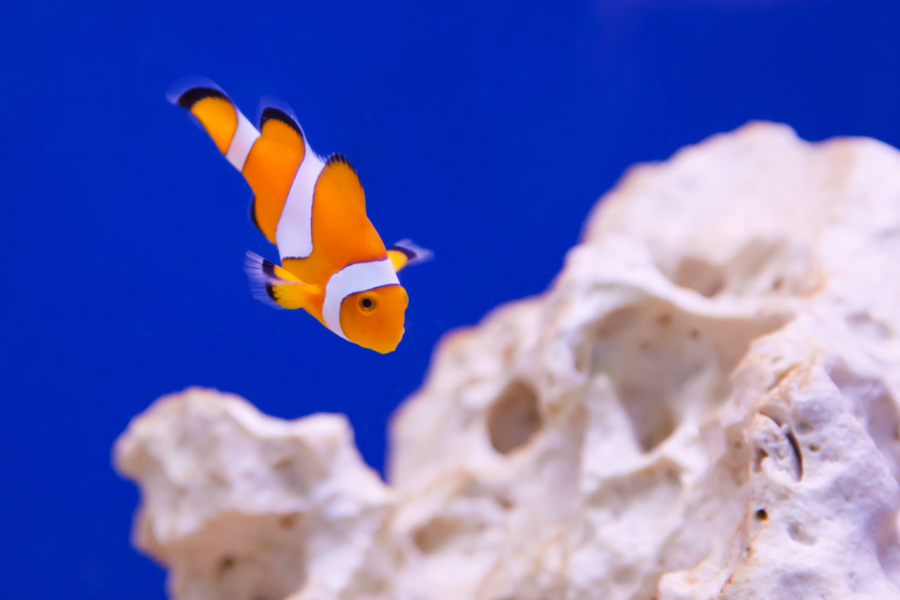Coral reefs create a colorful and lively habitat for marine life to thrive in. According to NOAA, coral reefs support over four thousand species of fish and eight hundred species of hard coral. Scientists believe there are still millions of species that have yet to be discovered.
These vibrant animals, who are also vegetables and minerals all wrapped into one, are crucial to support twenty-five percent of ocean life.
However, as the temperatures of the ocean rises, the coral reef population falls due to coral bleaching, ocean acidification, and pollution. More than fifty percent of coral reefs have already been bleached in the past thirty years and most species are threatened to become extinct.
According to Heirs To Our Oceans, coral bleaching occurs when the coral expels the zooxanthellae algae that supply the nutrients for the animal. Since the coral has no nutrition, it turns completely white and algae (that does not give the coral food) will eventually grow on top of the coral and permanently kill it. Warming temperatures in water can lead to bleaching.
Coral reefs are a huge tourist attraction and provide goods and services worth three hundred and thirty-seven billion dollars each year. However, many companies do not attempt to prevent people from touching and breaking the coral. This can cause stress to the polyp that contains the zooxanthellae and causes coral bleaching.
Ocean acidification happens when huge amounts of carbon dioxide are released into the atmosphere from burning fossil fuels. About thirty percent of what we release into the atmosphere winds up getting absorbed by the oceans which causes chemistry and acid level shifts in the water.
The raised acidity prevents coral from growing since the structure is being dissolved.
Additionally, pollution damages the population of coral reefs as well. Oil spills and trash that is dumped into the water increases the nutrient growth that can smother the corals in algae.
Coral reefs could disappear in thirty years if the world’s carbon footprint stays the same, according to National Geographic.
However, scientists around the world are finding solutions to help protect coral. Dr. Ruth Gates, a research scientist at the University of Hawaii at the Gates Coral Lab, is creating a coral breed to withstand the rising temperatures of water and ocean acidification. These “super corals” are set to be transferred onto bleached corals or damaged corals to repair what has been lost.
After, the super corals then breed with the other corals to create a resistance to the ocean acidification and bleaching. Dr. Gaines has been training the corals to adapt to their environment and recognize climate change problems.
This is crucial for the coral since most of them are dying due to the rising temperature waters. This benefits the habitat for all the organisms living in the reefs as well as over five hundred million people who depend on the coral reef revenue.
However, some may argue that “super coral” prevents biodiversity and all the different species of coral. The reefs contain over two thousand different breeds of coral and the “super coral” might take away that variety.
While I understand this perspective, action does need to happen and it is completely ethical to support the “super coral.” In 2016, rising temperatures encompassed fifty percent of coral reefs globally and was extremely severe. Then in 2017, there was more bleaching and seventy-five percent of global reefs turned white or were already dead and covered in algae. Potentially, there will be no more coral reefs if there is no action.
This is the potential solution that could save the remaining coral reefs before it is too late.
Marine biologists and scientists are not the only ones that can protect the coral reefs. To prevent the spread of algae in the ocean, one should use safe sunscreen that contains titanium dioxide and zinc oxide.
Reducing one’s carbon footprint is vital as well. Excessive carbon emissions are dangerous to coral reefs and many other habitats on earth. Simple actions like turning off the lights after using them, not charging a phone unless necessary, and walking or bike to places more often can make a positive impact.
Pollution is also an issue for coral reefs. Making sure one throws out their trash, recycles properly, and is mindful of oil spills can make a huge impact as well.
Touching coral reefs causes bleaching and damage to coral reefs. When traveling it is important to keep in mind to use eco-conscious tour companies who prevent the touching and breaking of coral.
It is not too late. People can make a huge difference just by doing everyday tasks a little differently.
“I think the question should be framed not really as to whether corals and coral reefs can bounce back but whether or not we’re going to take the responsibility to take and to give them that opportunity,” said Rebecca Albright, a marine biologist at the California Academy of Sciences, in a video about hope for coral reefs.













